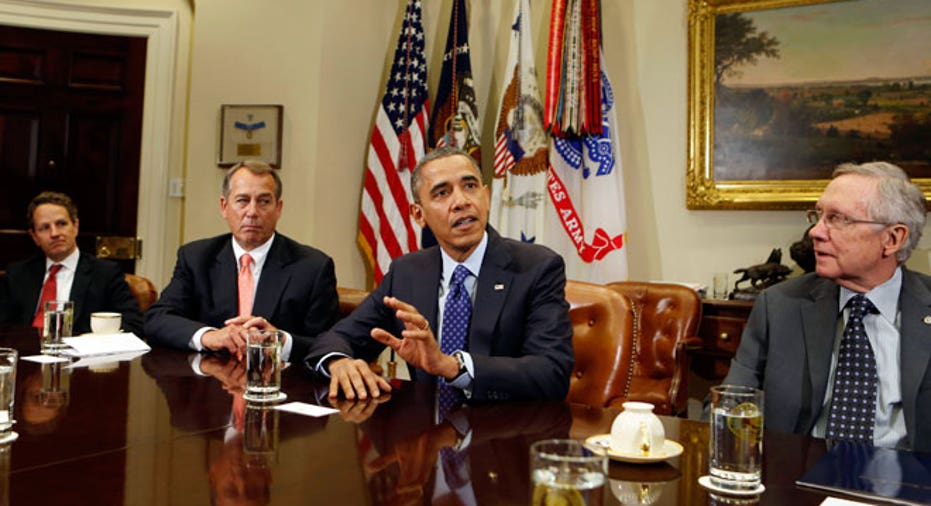Obama, Top Lawmakers Discuss Fiscal Cliff

Efforts to avert the "fiscal cliff" began in earnest on Friday as President Barack Obama met with top U.S. lawmakers to seek a deal to head off looming across-the-board tax hikes and spending cuts that could push the economy back into recession.
"I think we're all aware that we have some urgent business to do," Obama told reporters at the beginning of the meeting. "Our challenge is to make sure that we are able to cooperate together."
The hour-long session was not expected to yield much in the way of tangible results, but it could create a template for the coming weeks of negotiations.
"We've got to make sure that taxes don't go up on middle-class families, that our economy remains strong, that we're creating jobs - and that's an agenda that Democrats and Republicans and independents, people all across the country share," Obama said.
Nancy Pelosi, the top Democrat in the House of Representatives, said on Thursday she hopes the two sides can at least agree on the size of tax revenue and spending cuts that would be part of a bargain.
The meeting marked the first time Obama, a Democrat, has sat down with his Republican opposition since he won re-election last week.
All eyes will be on House Speaker John Boehner, the top Republican in Congress, who will have to balance the wishes of a newly confident president with the demands of his rank-and-file conservatives.
Senate Democratic Leader Harry Reid and Mitch McConnell, his Republican counterpart, also are attending.
Both sides are pledging cooperation even as they dig in on their long-held opening positions, and are eager to reassure nervous investors that they will reach a deal.
"Going over the fiscal cliff, in my view, is a bucket of crazy," Republican Representative Peter Roskam, one of Boehner's deputies, said at a budget conference.
Obama insists that tax rates on the wealthiest 2 percent of Americans must rise, while Republicans pledge that they will not agree to any rate increase.
There could be room for compromise.
Obama could agree to allow the top tax rate to rise to something less than the 39.6 percent he wants, from the current 35 percent. Policymakers, for example, could also agree to limit the tax increase to households making more than $500,000 annually, rather than the $250,000 cap Obama is demanding.
Republicans have suggested generating more revenue by limiting tax breaks for the wealthiest, rather than raising their rates. Obama has said that would not raise enough money.
The negotiators also need to confront $109 billion in domestic and military spending cuts due to kick in on January 2, the result of earlier failures to craft a more nuanced budget deal.
'THE HARD PART'
A senior Democratic Senate aide said it should be relatively easy to head off the cuts, known as "sequestration," if the two sides can get past the tax issue.
"The hard part is the tax cuts," the aide said. "Neither side wants sequestration to take place and that should be easy to solve in a balanced plan that has revenues."
Nonpartisan budget forecasters say failure to reach a deal could push the U.S. economy back into recession and drive up the unemployment rate.
Business leaders say the uncertainty is already weighing on the economy as employers postpone hiring and capital expenditures until they get a better sense of the tax and spending environment.
The S&P 500 has dropped 4.3 percent over the past two weeks, in part due to concerns over the fiscal cliff. Major U.S. stock indexes were down by about one-third of a percent on Friday.
The two sides could also agree to a temporary deal that would get them past the cliff and give them more time to work out a more lasting solution.
White House economic adviser Gene Sperling said the Obama administration is not interested in a solution that simply extends current provisions into next year.
"Compromise cannot be a dirty word if we want to move our country forward," Sperling said at a budget conference.
Lawmakers hope to revamp the U.S. tax code and retool expensive entitlement programs like Medicare, the government health insurance program for the elderly and disabled.



















